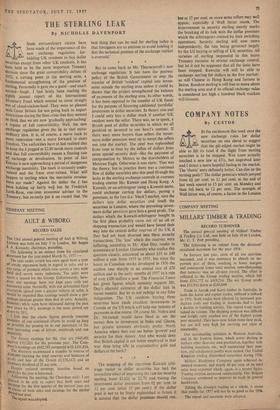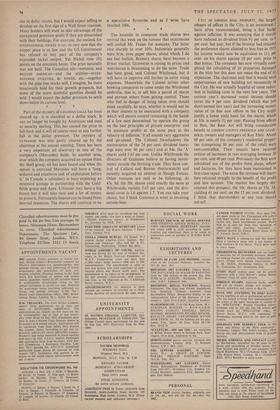COMPANY NOTES
By CUSTOS
IN the excitement this week over the
4 01 new exchange rules for dollar securities no one dared to suggest
that the gilt-edged market might be
able to lift its head if the flight from sterling securities is to be stopped. WAR LOAN actually touched a new low at 67 ,°s, but improved later and I detect a more hopeful feeling in the market. The 'shorts' were definitely better. Can this be the turning point? The dollar premium which jumped from 6} per cent. to 12 per cent. at the end of last week soared to 15 per cent. on Monday and then fell back to 12 per cent. The strength of Wall Street was, of course, a factor in the London rise in dollar stocks, but I would expect selling to develop on the first sign of a Wall Street reaction. Many holders will want to take advantage of the unexpected premium profit if they are dissatisfied with their holdings. For example, the outlook for INTERNATIONAL NICKEL is floc so rosy now that the copper price is so low and the US Government has refused to buy part of the company's expanded nickel output. Yet Nickel rose 102 points on the premium boost. The price naturally was not held. The Canadian oils--IMPERIAL and BRITISH AMERICAN-abd the utilities-INTER- NATIONAL UTILITIES, BC POWER, etc.-together with the pipe-line stocks will, I imagine, be more tenaciously held for their growth prospects, but some of the more doubtful gambles should be sold. 1 would expect the dollar premium to settle down below its current level.
* * *
Part of the mystery of CANADIAN EAGLE has been cleared up: it is classified as a dollar stock. It can no longer be bought by Americans and used as security sterling. This has caused the price to fall back and it will of course react to any further fall in the dollar premium. • The mystery of ULTRAMAR was also partly cleared up by the chairman at the annual meeting. There has been a very important oil discovery in one of the company's (Mercedes) fields. In another area, over which the company acquired an option from the Shell group, oil has been found and when the option is exercised Mercedes will have a 'long, arduous and expensive task of exploration before it.' In Canada a subsidiary is busy exploring an extensive acreage in partnership with the Gold- fields group and Apex. Ultramar may have a big future but it will take time and a lot of money to prove it. Fortunately finance can be found from internal resources. The shares will continue to be a speculative favourite and as I write have touched 100s.
* * *
The boomlet in consumer trade shares was revived this week on the rumour that DEBENHAms will outbid Mr. Fraser for BARKERS. The latter rose sharply to over 105s. Industrials generally were firm, even paper shares, about which I do not feel bullish. Brewery shares have become a firmer market. GUINNESS is raising its prices and WHITBREAD is threatening to do the same. Trade has been good, said Colonel Whitbread, but it will have to improve still further to cover rising expenses. Meanwhile the Colonel invites other brewing companies to come under the Whitbread umbrella, that is, to sell him a parcel of shares and prevent others from getting control. Those who feel in danger of being taken over should think carefully, he says, whether it would not be in their interest to be associated with a company which will ensure control remaining in the hands of a few men determined to operate the group on the best principles of private enterprise' and `to maintain profits at the same pace as the velocity of inflation.' It all sounds very aggressive and go-ahead. The Colonel foreshadows the maintenance of the 24 per cent, dividend (earn- ings were over 40 per cent.) and at 84s. the 'A' shares yield 5.65 per cent. Unlike Whitbreads the directors of Guinness believe in having invest- ments outside the brewing trade. They have con- trol of Callard and Bowser (butterscotch) and recently acquired an interest in Slough Estates. Other ventures are said to be following. At 43s. 9d. the 10s. shares yield exactly the same as Whitbreads, namely 5.65 per cent, and the divi- dend cover is 1.6 against 1.7. You can take your choice, but I think Guinness is wiser in investing outside beer. CITY OF LONDON REAL PROPERTY, the largest owners of offices in the City, is an investment I have often recommended, being a fair hedge against inflation. It was annoying that it should have reduced its dividend from 9+ per cent, to 9 per cent, last year, but if the investor had retained the preference shares allotted to him free in 1955 his income would now be equivalent to 114 per cent, on his shares against 10 per cent, prior to that bonus. The company has now virtually com- pleted the rebuilding of its properties damaged in the blitz but this does not mean the end of its , expansion. The chairman said that it would seize opportunities of new building not necessarily in the City. He was actually hopeful of some reduc- tion in building costs in the next few years. The current year's increased rental income should cover the 9 per cent, dividend (which was just short-earned last year) and the increasing money value of its fine new offices in the City might justify a lower yield basis for the shares, which at 33s. is nearly 52 per cent. Passing from offices to flats, the Rent Act will bring considerable benefit to LONDON COUNTY FREEHOLD AND LEASE- HOLD, owners and managers of Key Flats. About 60 per cent, of the company's residential proper- ties (comprising 80 per cent. of the total) were rent-controlled. Their tenants have received notices of increases in rent averaging between 30 per cent. and 40 per cent. Previously the flats were subsidised out of the profits from shops, offices and factories, for they have been-maintained in first-class repair. The extra flat revenue will there- fore rebound straight to the benefit of the profit and loss account. The market has largely dis- counted this prospect, the 10s. shares at 33s. 3d. yielding 41 per cent. on the 15 per cent, dividend. I think that shareholders at any rate should not sell.















































 Previous page
Previous page